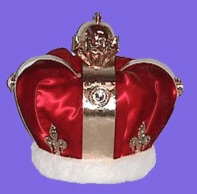Study to shew thyself approved unto God, a workman that needeth not to be ashamed, rightly dividing the word of truth. 2 Tim. 2:15

King James AV1611
The Kings of Israel
The Kings of Israel was taught by Dr. James Modlish
Lesson Seven
The Lame Prince
(2 Sam. 9)
(From the works of Pastor Warren W. Wiersbe)
I. Mephibosheth – The lost sinner
He was born in a rejected family. As the son of Jonathan, Mephibosheth was a member of a rejected family. He was a son of a prince, yet was living in dependence on others away from the city of Jerusalem. Every lost sinner today is born in sin, born into Adam’s family and is thus under condemnation. (Romans 5:12; Eph. 2:1-3)
He experienced a fall and could not walk. He was lame on both feet (3,13) and thus could not walk. Men today are sinners because of the fall of Adam (Romans 5:12), and they cannot walk so as to please God. Instead of walking in obedience, sinners walk “according to the course of this world.” (Eph. 2:2) Men may try to walk to please God, but no amount of self-effort or good works will save them.
He was missing the best. He lived at “Lo-debar” which means “no pasture.”
What a description of this present world: no pasture, no place for the souls to be satisfied. Men are hungry and thirsty, but this world and its pleasures cannot satisfy.
He would have perished without David’s help. We would never have heard of Mephibosheth were it not for the gracious steps David took to save him. His name was written down in God’s Word because David reached him and helped him. What a tragic situation the lost sinner is in! He has fallen; he cannot walk to please God; he is separated from home; he is under condemnation; he cannot help himself!
II. David – The gracious saviour
David made the first move. Salvation is of the Lord! He must take the first
steps, because the lost sinner will not by nature seek God. (Rom. 3:10-12) David sent for poor Mephibosheth, just as God sent Christ to this earth to “seek and to save that which was lost.” (Luke 19:10)
David acted for Jonathan’s sake. This grew out of the loving covenant that David had made with Jonathan years before. (I Sam. 20:11-23) David had never seen Mephibosheth, yet he loved him for Jonathan’s sake. We are not saved for our own sake, or even for the sake of society; we are saved FOR THE SAKE OF CHRIST! We are forgiven for His sake. (Eph. 4:32) We are accepted “in the Beloved.” (Eph. 1:6) It was part of that “everlasting covenant” (Heb. 13:20-21) that the Father should save for Jesus’ sake all that trusted the Saviour.
It was an act of kindness. In vs. 3 David calls it “the kindness of God!” Christ shows His kindness to us in saving us. (Eph. 2:7; Titus 3:4-7) David’s throne was a throne of grace, not a throne of justice. Mephibosheth had no claim upon David; he had absolutely no case to present. Had he appeared before that throne asking for justice, he would have received condemnation!
David called him personally and he came. David sent a servant to bring him (vs. 5), but the servant then stepped out of the way to make room for the King. No man is saved by a preacher or evangelist; all the servant can do is usher the sinner into the presence of Christ. Note how Mephibosheth fell humbly before David, for he knew his place as a condemned man. How tenderly David said, “Mephibosheth.” “He calleth His own sheep by name.” (John 10:3)
David took him into his own family. Like many sinners today, Mephibosheth wanted to be a servant (6,8), but David made him a son. (11) The Prodigal son wanted to be a servant, too, but no man can earn salvation. “Beloved, now are we the sons of God!” See I John 3:1 and John 1:11-13.
David spoke peace to him. “Fear not!” were David’s words of grace to the trembling cripple; and “Fear not!” is what Christ says to every believing sinner. “There is therefore now no CONDEMNATION…” (Rom. 8:1) Through the Word of God we have the peace of God.
David provided for his every need. (9-10) Mephibosheth would no longer live at “No Pasture;” for now he would eat daily at the king’s table. Furthermore, the servant Ziba and his sons became servants to Mephibosheth! And David gave to Mephibosheth all of the inheritance that belonged to him. So Christ satisfies the spiritual and material needs of His family. He has given us an eternal inheritance. (Eph. 1:11,18; I Peter 1:4; Col. 1:12) If He gave us our rightful inheritance, we would go to hell! But in His grace He has chosen us to share His inheritance with Him, for we are “joint-heirs with Christ.” (Rom. 8:17)
-Page Navigation-
Lessons: 1 | 2 | 3 | 4 | 5 | 6 | 7 | 8 | 9 | 10 | 11 | 12 | 13 | 14 | 15 | 16 | 17 | 18 | 19 | 20 | 21

